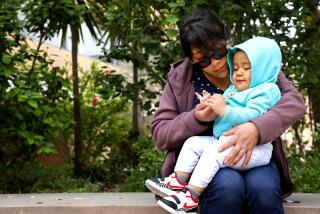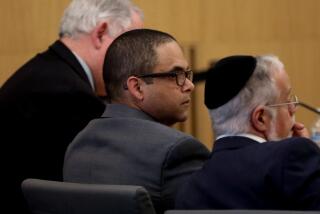Murder Trial Jurors Deliberating a Mystery
- Share via
The wife of Los Lobos lead singer and guitarist Cesar Rosas was “ripped from her life” by a half brother who killed her in the family van, prosecutors argued Monday.
But the alleged killer’s defense attorney said the case against his client was full of holes, including the fact that no body has been found. “We don’t have proof that she is dead--just that she’s missing,” Antonio Bestard said.
Those starkly different views were laid before Pomona Superior Court jurors Monday in closing arguments at the end of the weeklong kidnapping and murder trial of Gabriel Gomez, 40.
Gomez is charged with taking 47-year-old Sandra Rosas from her Rowland Heights home on Oct. 23, 1999, killing her and then disposing of the body.
She has never been located, but the family’s bloodstained van was found in La Puente a couple of days after she disappeared. Gomez, of Whittier, faces life in prison if convicted.
“She was ripped from her life,” Deputy Dist. Atty. Donald Clem told jurors. “She did not voluntarily give up her life. She was in a position where she could give to others. She invited the defendant into her home.”
Clem said Monday that Gomez “wanted to be part” of the fame and fortune his half sister enjoyed because of the Grammy-winning Los Lobos rock group, which has won wide popularity with its East Los Angeles-influenced music.
Clem said that after killing Rosas, a panicky Gomez ripped an adjustment bar from a van seat. He recounted to jurors how a police dog picked up Gomez’s scent in the van, then traced it to a nearby phone booth and to the La Puente home of a friend of Gomez.
During the trial, Clem called more than 20 witnesses, including a county probation officer and a jailer who said Gomez incriminated himself.
Ralph Munoz, a county probation officer, testified that Gomez, while in jail after his arrest, told him he might have done something to his half sister but he couldn’t remember because he was drunk.
Because no body has been found, prosecutors used the testimony of two criminalists from the county crime laboratory to suggest that a struggle took place in the van. The criminalists told jurors that most of the 13 bloodstains found there were the victim’s or the defendant’s.
But Bestard, in his closing argument Monday, said there were major problems with the prosecution’s case.
“This is a circumstantial case,” he said.
“You don’t have a body. You don’t have a crime scene. We don’t have proof that she is dead--just that she’s missing.”
Bestard discounted testimony from Rosas’ daughters that when she disappeared, they called Rosas’ cellular phone and overheard Gomez threaten to strangle, rape and kill her.
Bestard said that Gomez and his sister often yelled at each other in a disparaging manner.
“There was no serious threat from Gabriel to Sandra when they were behaving this way,” he said.
Bestard also disputed the prosecutors’ claims that Gomez was after his half sister’s money. He cited testimony from two former co-workers that Gomez recently had taken a job as a temporary dockworker.
The jury began its deliberations in the afternoon and considered the case for about 90 minutes before being sent home by Judge Robert M. Martinez.
More to Read
Sign up for Essential California
The most important California stories and recommendations in your inbox every morning.
You may occasionally receive promotional content from the Los Angeles Times.










